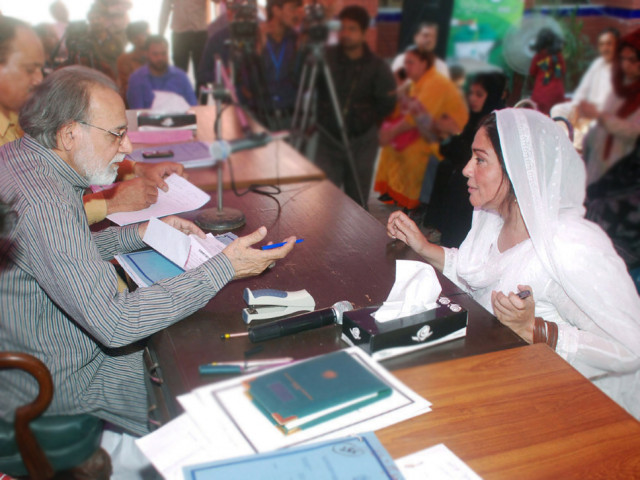Ruthless scrutiny keeps candidates on their toes
Apart from religion, the ROs also took a strong stand over tax defaults.

A returning officer scrutinises a candidate's nomination papers. PHOTO: NNI/ FILE
If Najma Bibi was unable to recite the Dua-e-Qanoot, she would have been unable to contest the upcoming elections, despite her status as a law-abiding and upright citizen, who paid her taxes regularly.
However, her memory served her well and she breezed through the returning officer’s ‘ruthless’ scrutiny.
Bibi, a 60-year-old political aspirant backed by the Pakistan Muslim League-Nawaz, recited the dua seamlessly, prompting RO Jalaluddin Soomro to accept her nomination papers and declare her eligible to contest the general elections for a provincial assembly seat in Sindh.
“The returning officer only asked me to recite the Dua-e-Qanoot, which I did confidently, so he accepted my papers,” Bibi, who intends to stand for PS-110 in Karachi, told The Express Tribune.
The second question was a textbook classic. “How many Farz are in the Namaz-e-Isha?”
Under the Election Commission of Pakistan’s policy on judging the eligibility of candidates, the returning officers have initiated ‘ruthless’ scrutiny in accordance with the Articles 62 and 63 of the Constitution.
Such relentlessness was visible at City Courts, where sessions judges are performing duties as ROs.
Like Bibi, all other candidates were asked to recite first Kalma, second Kalma or Dua-e-Qanoot, declare, on oath, whether or not they believe in one God (Allah), and to confirm whether they fulfill their religious obligations such as regularly offering prayers and performing Umrah or Hajj.
The Muttahida Qaumi Movement’s Faisal Sabzwari was asked whether he could recite the first Kalma.
The party leader, who intends to run from NA-250 Karachi, replied, “Yes, I’m a born Muslim”.
He was then asked whether he had performed Hajj. Upon replying that he had not, the RO offered some ‘friendly’ but unsolicited advice: “Do perform Hajj, it is also a religious obligation,” he said, while accepting his nomination forms.
Article 62 of the Constitution pertains to the qualification for membership of Parliament and requires a candidate to be of good character, who is not commonly known as one who violates the Islamic injunction and has knowledge of the ideology of the country, among other requirements.
While a majority of the candidates did not object to the kinds of questions they were asked, some had reservations.
“I’ve contested three times for different posts, but have never experienced such questions. Where is Dr Tahirul Qadri? He had demanded such a criteria and has himself escaped abroad,” said Najma Bibi.
Tax evasion
Apart from religion, the ROs also took a strong stand over tax defaults and refused to accept many candidates’ nomination forms until their dues are cleared.
The list of defaults included loans obtained from the bank and taxes levied by the federal and provincial governments and civic agencies. Many candidates were also rejected for not having paid dues owed to the gas, water, power utility agencies.
“There is an exemption on default of taxes and dues up to Rs10,000 that have not been paid for the last six months. Any default exceeding this volume must to be cleared, for the candidate to be declared eligible,” a returning officer told an independent candidate, Muhammad Usman Sarothia, who lives in a rented flat and wants to contest polls from a provincial seat.
His papers, however, were not accepted because his landlord owed Rs95,564 to the Karachi Water and Sewerage Board.
Published in The Express Tribune, April 7th, 2013.



















COMMENTS
Comments are moderated and generally will be posted if they are on-topic and not abusive.
For more information, please see our Comments FAQ